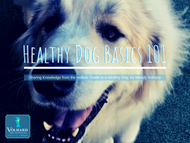Food, What Difference Does it Make?
Posted by -Danae Apel & Brenda Pilla on Mar 22nd 2019
Nutrition is the foundation for a healthy body. We know this from the human-side, but this also transfers over to the animal kingdom.
What is affected by a dog’s nutrition?
- Length of Life
- Overall Health & Immune System
- Behavior & Temperament
- Recovery time from Trauma
- Ability to Reproduce Successfully
- Coping with Everyday Stresses and Strains
There are six key building blocks for a proper nutritional foundation. The quality of these building blocks and the ratio to one another will determine the quality of your dog’s health.
1.Protein
2.Fats
3.Carbohydrates
4.Vitamins
5.Minerals
6.Water
Just like every dog is different, they have different caloric needs. While the number of calories is important, the SOURCE of those calories is equally important. A food’s ability to produce energy is measured in calories. The quality and amount of fuel that you provide to your dog will determine their output of energy. This energy is seen through their running, playing, working, and living a long healthy life. If your dog’s food provides calories from high-quality ingredients and in the right proportions, the dog’s body will be able to produce energy for growth, maintenance, and ability to fight disease.
Growth
During the first year of life, a puppy will increase their birth weight up to 60 times (depending on the breed). Compared to humans, canines grow much quicker, about 12 times faster. As a result, even a short period of time without proper nutrition can affect their growth and development. It is imperative to start your puppy out with a solid foundation, built on good nutrition.
Maintenance
There is no cookie-cutter diet for your dog. Every dog is going to have a different metabolism, daily activity level, and lifestyle demands. A couch-potato will not have the same requirements as a hunting dog. Your dog may also be affected by the climate in which you live in. For example, if you live in a colder climate, your dog will require more food to maintain a regulated body temperature. In hotter climates, you’ll feed smaller portions using more calorie-dense foods. Overall, it is a good practice to pay attention to your dog’s weight regularly.
Stress
Stress is something we are all familiar with. Unbalanced nutrition in your canine can also be a source of stress. The weakest parts of the body will be where the stress manifests. Some outward examples of stress could be: digestive issues, fear of thunderstorms, ear infections, skin issues, inability to breed, and kidney or bone diseases.
As you can see, a nutritionally balanced diet is necessary for keeping your dog happy and healthy throughout its many years! Please stay tuned for future blogs discussing the ingredients needed for a proper diet!


